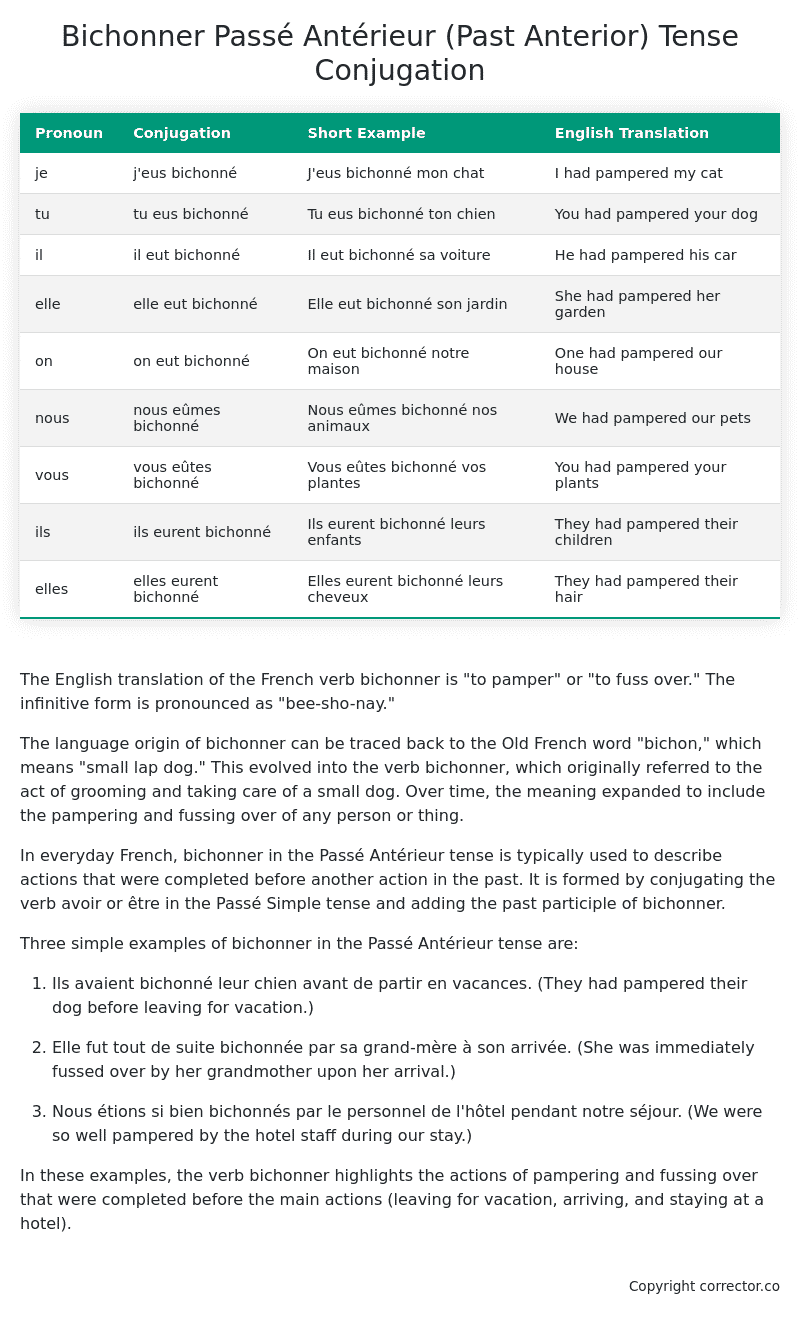Passé Antérieur (Past Anterior) Tense Conjugation of the French Verb bichonner
Introduction to the verb bichonner
The English translation of the French verb bichonner is “to pamper” or “to fuss over.” The infinitive form is pronounced as “bee-sho-nay.”
The language origin of bichonner can be traced back to the Old French word “bichon,” which means “small lap dog.” This evolved into the verb bichonner, which originally referred to the act of grooming and taking care of a small dog. Over time, the meaning expanded to include the pampering and fussing over of any person or thing.
In everyday French, bichonner in the Passé Antérieur tense is typically used to describe actions that were completed before another action in the past. It is formed by conjugating the verb avoir or être in the Passé Simple tense and adding the past participle of bichonner.
Three simple examples of bichonner in the Passé Antérieur tense are:
-
Ils avaient bichonné leur chien avant de partir en vacances. (They had pampered their dog before leaving for vacation.)
-
Elle fut tout de suite bichonnée par sa grand-mère à son arrivée. (She was immediately fussed over by her grandmother upon her arrival.)
-
Nous étions si bien bichonnés par le personnel de l’hôtel pendant notre séjour. (We were so well pampered by the hotel staff during our stay.)
In these examples, the verb bichonner highlights the actions of pampering and fussing over that were completed before the main actions (leaving for vacation, arriving, and staying at a hotel).
Table of the Passé Antérieur (Past Anterior) Tense Conjugation of bichonner
| Pronoun | Conjugation | Short Example | English Translation |
|---|---|---|---|
| je | j’eus bichonné | J’eus bichonné mon chat | I had pampered my cat |
| tu | tu eus bichonné | Tu eus bichonné ton chien | You had pampered your dog |
| il | il eut bichonné | Il eut bichonné sa voiture | He had pampered his car |
| elle | elle eut bichonné | Elle eut bichonné son jardin | She had pampered her garden |
| on | on eut bichonné | On eut bichonné notre maison | One had pampered our house |
| nous | nous eûmes bichonné | Nous eûmes bichonné nos animaux | We had pampered our pets |
| vous | vous eûtes bichonné | Vous eûtes bichonné vos plantes | You had pampered your plants |
| ils | ils eurent bichonné | Ils eurent bichonné leurs enfants | They had pampered their children |
| elles | elles eurent bichonné | Elles eurent bichonné leurs cheveux | They had pampered their hair |
Other Conjugations for Bichonner.
Le Present (Present Tense) Conjugation of the French Verb bichonner
Imparfait (Imperfect) Tense Conjugation of the French Verb bichonner
Passé Simple (Simple Past) Tense Conjugation of the French Verb bichonner
Passé Composé (Present Perfect) Tense Conjugation of the French Verb bichonner
Futur Simple (Simple Future) Tense Conjugation of the French Verb bichonner
Futur Proche (Near Future) Tense Conjugation of the French Verb bichonner
Plus-que-parfait (Pluperfect) Tense Conjugation of the French Verb bichonner
Passé Antérieur (Past Anterior) Tense Conjugation of the French Verb bichonner (this article)
Futur Antérieur (Future Anterior) Tense Conjugation of the French Verb bichonner
Subjonctif Présent (Subjunctive Present) Tense Conjugation of the French Verb bichonner
Subjonctif Passé (Subjunctive Past) Tense Conjugation of the French Verb bichonner
Subjonctif Imparfait (Subjunctive Imperfect) Tense Conjugation of the French Verb bichonner
Subjonctif Plus-que-parfait (Subjunctive Pluperfect) Tense Conjugation of the French Verb bichonner
Conditionnel Présent (Conditional Present) Tense Conjugation of the French Verb bichonner
Conditionnel Passé (Conditional Past) Tense Conjugation of the French Verb bichonner
L’impératif Présent (Imperative Present) Tense Conjugation of the French Verb bichonner
L’infinitif Présent (Infinitive Present) Tense Conjugation of the French Verb bichonner
Struggling with French verbs or the language in general? Why not use our free French Grammar Checker – no registration required!
Get a FREE Download Study Sheet of this Conjugation 🔥
Simply right click the image below, click “save image” and get your free reference for the bichonner Passé Antérieur tense conjugation!

Bichonner – About the French Passé Antérieur (Past Anterior) Tense
Formation of the Passé Antérieur
Common Usage Patterns
Literature
Historical Texts
Formal Writing
Interactions with Other Tenses
Passé Composé (Present Perfect)
Imparfait (Imperfect)
Futur Antérieur (Future Perfect)
Summary
I hope you enjoyed this article on the verb bichonner. Still in a learning mood? Check out another TOTALLY random French verb conjugation!


